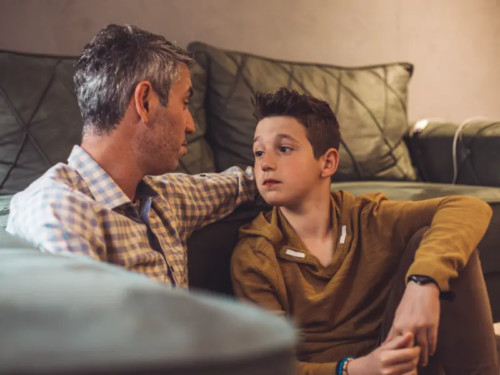
Table of Contents
5 Tips for Healing From Emotional Abuse

Written By: Ashley Laderer

Clinically Reviewed By: Dr. Don Gasparini
Updated: June 27, 2024
7 min.
Emotional abuse can have long-lasting effects on mental health, but healing is possible. Here’s how.
Learn more about our Clinical Review Process
Table of Contents
Emotional abuse –– sometimes called psychological abuse –– is a form of emotional trauma that involves manipulating or intimidating someone through verbal attacks, threats, or other non-physical abusive behavior. Like any kind of trauma, emotional abuse can lead to long-term mental health struggles, including anxiety, depression, and post-traumatic stress disorder (PTSD).
However, healing from emotional trauma is absolutely possible –– whether you’re coping with childhood trauma, such as childhood emotional abuse by parents, or more recent trauma due to psychological abuse in an emotionally abusive relationship, or anything in between. Here’s what you need to know on your path to healing from emotional abuse.
5 tips for healing from emotional trauma
From being kind to yourself to seeking professional trauma-informed care, here are five tips for healing from emotional trauma. Although emotional healing takes hard work, dedication, and perseverance, you can do this.
1. Acknowledge the trauma
Since trauma is so painful, you may be tempted to sweep it under the rug and ignore the feelings — whether the emotional abuse happened in childhood or occurred more recently due to a toxic relationship (or something else). However, the first step towards healing is acknowledging emotional trauma and validating your feelings. Repressing the trauma or pretending it never happened will not do you any favors. Also, take time to acknowledge that emotional abuse has the power to create long-lasting trauma. It is valid –– just as valid as physical abuse or sexual abuse.
Practice self-compassion and kindness, reminding yourself that what you have been through was very difficult, and you’re allowed to feel whatever feelings come up. Remember that it’s normal to experience a wide range of intense emotions about your trauma: sadness, anger, shame, guilt, fear, and more. Give yourself permission to feel it all without judgment or self-criticism. What you’re going through isn’t easy.
2. Lean on your support network
Social support plays a vital role in the healing process for individuals recovering from emotional trauma. A strong network of supportive loved ones can provide you with a nurturing environment that will help you rebuild trust in others while getting emotional support. Social support allows you to feel safe and more comfortable as you go about life after emotional trauma.
Supportive friends, family members, or partners can provide a space for you to feel heard, understood, and validated. Sharing your experiences without judgment or criticism can feel really good. Also, emotional trauma can leave individuals feeling isolated. Social support helps combat this. Being surrounded by caring people who offer comfort, understanding, and empathy can help reduce your feelings of loneliness and promote emotional healing.
You may also seek social support in the form of a support group. Connecting with other survivors of emotional abuse can create a sense of community. A support group for survivors gives people the chance to connect, share stories, exchange advice and coping strategies, and gain a sense of belonging with others who have a shared understanding of emotional trauma.
3. Seek therapy
Seeking professional help from a therapist is one of the best things you can do for yourself while healing from emotional trauma. Therapists who practice trauma-informed care are essential for trauma recovery. They can provide you with a safe space to process your trauma and work through it. Here are a few specific types of therapy that can be especially beneficial for trauma survivors and people with PTSD:
Cognitive behavioral therapy (CBT)
CBT helps emotional abuse victims reframe their thinking and develop healthier behaviors that will benefit their well-being. This therapy will help you learn how your thoughts, feelings, and behaviors are interconnected. You will become more aware of negative thoughts and unhelpful behaviors surrounding your emotional trauma, and in turn, you can change and shift into healthier patterns.
In CBT, your therapist will teach you valuable coping skills like mindfulness techniques, grounding methods, and breathing exercises. These tools can help you stay calm and present when experiencing heightened emotions and anxiety or having flashbacks about your trauma.
Trauma-focused cognitive behavioral therapy (TF-CBT)
TF-CBT is a specialized form of CBT that’s specifically designed for kids and teens who are childhood trauma survivors, along with their caregivers. With the help of a trauma-informed therapist, you’ll recount the details of your trauma to process what happened. In this trauma therapy, you will learn emotional regulation, coping skills, and how to look at your trauma in a new light.
Additionally, caregivers, such as your parents (if they are not the perpetrators of the trauma), will learn to comprehend the trauma and how to provide the best care. There will be sessions where you see the therapist alone and sessions where you see the therapist with your parents or caregiver, too.
Prolonged exposure (PE)
PE is a type of exposure therapy. Survivors of emotional abuse often avoid triggers that remind them of their trauma. PE guides survivors in gradually confronting these triggers in a safe, supportive environment. Exposure may be “imaginal,” meaning visualizing the trauma and talking about it in vivid detail while in a therapy session, or “in vivo,” meaning exposure to triggers in real life outside of therapy. Your therapist will come up with a plan to help you work up to this step.
Exposure helps retrain your brain to feel safer in such situations instead of perpetuating fear through avoidance. PE empowers survivors to face their traumatic memories and regain a sense of control in their lives.
Eye movement desensitization and reprocessing therapy (EMDR)
EMDR is a unique type of trauma therapy that was designed for people with PTSD. The goal is to reduce how vividly and emotionally charged traumatic memories are stored in the brain. Back-and-forth eye movements or another type of bilateral (left/right) stimulation are used to process distressing memories.
When memories are processed like this, the brain can store them and look at them in a less triggering way. Ultimately, EMDR therapy will make you desensitized to the traumatic memories of your emotional abuse, ensuring that you experience less of a visceral reaction when you think of the memory.
4. Practice self-care
It’s important to take care of yourself. Trauma and its lasting effects can take a toll on both mental and physical health. For this reason, it’s crucial to do things that will benefit your overall well-being. Here are some self-care ideas to consider:
Exercise
Regular physical activity is crucial for good physical and mental health. Exercise can relieve stress and boost your mood. Research has also suggested that exercise, especially in greater amounts, can reduce PTSD symptoms.
Maintain a nutritious diet
Take a step back and evaluate what you’re eating. If your diet lacks nutrient-rich foods, consider changing this up. Don’t underestimate the power of going back to the basics –– a balanced, healthy diet full of the nutrients you need is key for physical and mental health.
Prioritize sleep
Clocking in enough quality sleep is essential for mental and physical health. Sleep deprivation may worsen mental health conditions. The CDC recommends that teens ages 13 and older get eight to 10 hours of sleep, and young adults over 18 should get at least seven hours.
Practice mindfulness
Mindfulness and meditation help you learn to be present without judging your feelings. Maintaining a mindfulness or meditation practice can benefit both your physical and mental health. Plus, researchers have found that mindfulness may reduce PTSD symptoms.

Avoid substances
Drugs and alcohol can worsen your mental health and lead to further complications such as dependence, substance use disorder, substance abuse, or other dangerous behavior. It is much better to rely on healthier, more effective coping tools instead of using substances to mask your pain.
Get creative
Trauma can make you feel tons of emotions. A creative outlet like making art or music will allow you to express your feelings in a new, healthy way. Creativity can help you with self-discovery and healing.
5. Be patient with yourself
It’s understandable that you want to feel better ASAP, but it’s super important to be patient while healing from emotional trauma. This process takes time. It may take longer to heal if you’re coping with complex trauma that has occurred over an extended period of time.
Also, you should remember that healing from any mental health struggle is not linear. Some days, you might feel amazing, while other days may feel more challenging –– and that’s okay. Patience means being kind to yourself and accepting that healing takes time. It’s not going to happen overnight. It requires you to put in effort and hard work.
Understand that you’re on your own unique healing journey, and this journey will look different from other people’s. Try to focus on yourself rather than comparing your healing journey to others. Be patient with yourself, show yourself kindness, and celebrate small wins. Every little bit of progress brings you closer to healing from emotional trauma, reclaiming your strength, and finding your way to a brighter future.

How Charlie Health can help
If you or a loved one is an emotional abuse survivor, Charlie Health is here to help with the healing process. Charlie Health’s virtual Intensive Outpatient Program (IOP) provides more than once-weekly mental health treatment for young people and families dealing with serious mental health conditions, including trauma. Our expert clinicians incorporate evidence-based therapies into individual counseling, family therapy, and group sessions. With this kind of holistic online therapy, managing trauma is possible. Fill out the form below or give us a call to start healing today.
References





